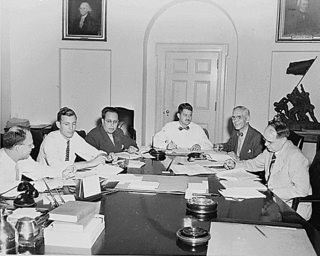
Edwin Griswold Nourse was an American economist who served as the first chairman of the Council of Economic Advisers from 1946 to 1949.

Gerard Swope was an American electronics businessman. He served as the president of General Electric Company between 1922 and 1940,and again from 1942 until 1945. During this time Swope expanded GE's product offerings,reorienting GE toward consumer home appliances,and offering consumer credit services.

David Leo Lawrence was an American politician who served as the 37th Governor of Pennsylvania from 1959 to 1963. The first Catholic elected as governor,Lawrence is the only mayor of Pittsburgh to have also been elected as Governor of Pennsylvania. He served four terms as mayor,from 1946 through 1959.

John Roy Steelman was the first person to serve as "The Assistant to the President of the United States",in the administration of President Harry S. Truman from 1946 to 1953. The office later became the White House Chief of Staff.

Adrian Sanford Fisher was an American lawyer and federal public servant,who served from the late 1930s through the early 1980s. He was associated with the Department of War and Department of State throughout his professional career. He participated in the U.S. government's decision to carry out Japanese-American internment and the international (1945–46) Nuremberg trial,and in State Department Cold War activities during the Harry S. Truman administration. He was the State Department Legal Adviser under Secretary of State Dean Acheson. During the John F. Kennedy,Lyndon B. Johnson and Jimmy Carter administrations,Fisher was directly involved in the negotiations of international nuclear testing and non-proliferation agreements.

Harry S. Truman was the 33rd president of the United States,serving from 1945 to 1953. A leader of the Democratic Party,he previously served as the 34th vice president from January to April 1945 under Franklin Roosevelt and as a United States senator from Missouri from 1935 to January 1945. Assuming the presidency after Roosevelt's death,Truman implemented the Marshall Plan to rebuild the economy of Western Europe and established both the Truman Doctrine and NATO to contain the expansion of Soviet communism. He proposed numerous liberal domestic reforms,but few were enacted by the Conservative Coalition which dominated the Congress.

Max Lowenthal (1888–1971) was a Washington,DC,political figure in all three branches of the federal government in the 1930s and 1940s,during which time he was closely associated with the rising career of Harry S. Truman;he served under Oscar R. Ewing on an "unofficial policy group" within the Truman administration (1947–1952).

William Henry Hastie Jr. was an American lawyer,judge,educator,public official,and civil rights advocate. He was the first African American to serve as Governor of the United States Virgin Islands,as a federal judge,and as a federal appellate judge. He served as a United States circuit judge of the United States Court of Appeals for the Third Circuit and previously served as District Judge of the District Court of the Virgin Islands.

This bibliography of Harry S. Truman is a selective list of scholarly works about Harry S. Truman,the thirty-third president of the United States (1945–1953). See also the bibliographies at Harry S. Truman,Presidency of Harry S. Truman,and Foreign policy of the Harry S. Truman administration.

The 1946 United States elections were held on November 5,1946,and elected the members of the 80th United States Congress. In the first election after World War II,incumbent President Harry S. Truman and the Democratic Party suffered large losses. After having been in the minority of both chambers of Congress since 1932,Republicans took control of both the House and the Senate.

William Loren Batt was an American mechanical engineer,and president SKF Industries,Inc.,awarded the Order of Vasa in 1923,the Henry Laurence Gantt Medal in 1940,and the Hoover Medal in 1951.
Jerry N. Hess (1931–2017) was a 20th-Century American oral historian of U.S. presidential libraries,particularly the Harry S. Truman Library:his name appears in numerous books which include research into major personalities related to mid-20th-Century American national politics and draw upon the more than 500 oral histories available at the Truman Library alone.
Stephen J. Spingarn was a mid-20th-century American lawyer and civil servant in the Franklin Delano Roosevelt,Harry S. Truman,and (briefly) Dwight D. Eisenhower administrations,including Special Counsel (1949) and Administrative Assistant to Truman (1950) and lastly commissioner on the Federal Trade Commission (1950–1953) during transition to Eisenhower.

Matthew J. Connelly was an American civil servant under Harry S. Truman,who having risen to Executive Secretary to Vice President Truman and then Appointments Secretary to President Truman,was indicted for bribery in 1955,convicted in 1956,served six months in prison in 1960,and was granted a full pardon by President John F. Kennedy in 1962.

Oscar R. Ewing was a 20th-century American lawyer,social reformer,and politician who was one of the main authors of the Fair Deal program of U.S. President Harry S. Truman.

John Lowenthal (1925-2003) was a 20th-century American lawyer,civil servant,law professor,and documentary filmmaker,who defended the name and reputation of family friend Alger Hiss almost all his life.
Milton Lehman (1917–1966) was an American freelance journalist and book author,best known for his 1963 biography of rocket scientist Robert Goddard.

Louis Hyman Bean was an American economic and political analyst who is best known for predicting Harry S. Truman's victory in the 1948 presidential election.

Sherman Minton was nominated to serve as an associate justice of the Supreme Court of the United States by U.S. President Harry S. Truman on September 14,1949 after the death in office of Wiley Rutledge created a vacancy on the Supreme Court. Per the Constitution of the United States,Minton's nomination was subject to the advice and consent of the United States Senate,which holds the determinant power to confirm or reject nominations to the U.S. Supreme Court. The nomination was met with a mixed reception and faced active opposition stemming both from the belief that Minton would be a liberal justice and from his history as a New Deal-supporting member of the United States Senate. There was an unsuccessful effort to compel Minton to testify before the United States Senate Committee on the Judiciary. Nevertheless,the nomination was approved by a 48-16 vote of the United States Senate on October 4,1949.















